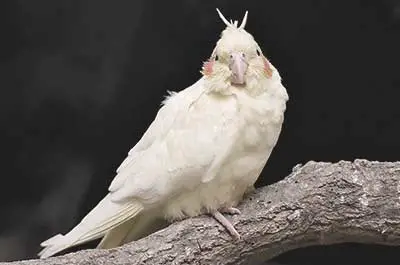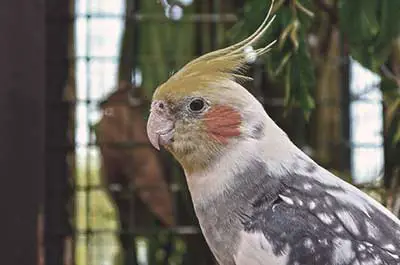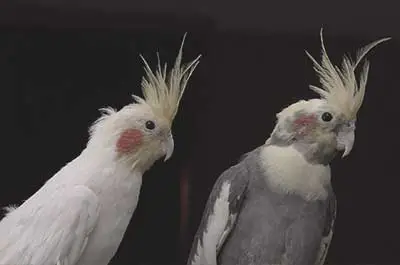If you’re the proud owner of a cockatiel, congratulations! These amazing little creatures make wonderful pets. But like all pets, they require some care and attention to keep them healthy and happy. Here are 10 tips to help you care for your cockatiel:
Keep their diet balanced and varied.

Like all animals, cockatiels require a balanced and varied diet to stay healthy. A cockatiel’s diet should consist of various seeds, fruits, vegetables, and pellets. Be sure to mix up the types of food you give them and avoid overfeeding them. Too much of one kind of food can lead to health problems.
Cockatiels also need plenty of freshwaters to stay healthy. Make sure their water dish is clean and full at all times. It’s important to change their water daily, especially if you live in a warm climate. They may also enjoy baths, but only offer them a bath if they seem to want one.
Keep their environment clean.
Cockatiels are messy creatures, and they love to play in their food and water. This can lead to a dirty environment, which can be bad for your bird’s health. Be sure to clean their cage and perches regularly with hot, soapy water. It’s also important to vacuum around their cage to help keep the area clean and dust-free.
Cockatiels are very messy eaters, and they can easily make a mess in their cage. Be sure to keep their environment clean by regularly cleaning their cage and changing their bedding. You may also want to invest in a cage liner to help make cleanup easier. A cage liner is a piece of cloth that goes under the bedding and can be easily removed and washed.
Be careful with chemicals.
Cockatiels are very sensitive to chemicals and cleaning products. Be sure to use only bird-safe products in their environment. When cleaning their cage, perches, or toys, use only hot water and soap. Avoid using any harsh chemicals or cleaners.
Also, you need to be careful with what you put in their cage. Some plants are poisonous to cockatiels, so it’s important to avoid putting anything in their environment that could potentially be harmful.
Provide them with plenty of toys.
Cockatiels love to play, and they need a variety of toys to keep them entertained. Be sure to provide your bird with a variety of toys, including perches, swings, mirrors, and chew toys. Rotate their toys regularly to keep them from getting bored, and offer them new toys to keep them stimulated.
Cockatiels are very active and playful creatures. They need plenty of toys to keep them entertained and stimulated. Be sure to offer a variety of toys, including ones that promote chewing and preening. Chewing helps keep their beaks trim and healthy, while preening helps them stay clean and tidy.
Toys also help prevent boredom, which can lead to behavioral problems. Bored cockatiels are often the ones that get into trouble.
Not all cockatiels are alike. Each one has its own personality and quirks. As a pet owner, it’s important to be aware of these and cater to your bird’s individual needs. If you see your bird acting differently than usual or isn’t eating or playing like they usually do, take them to a vet. They may be sick or have a problem.
Give them a birdcage that is large enough.

The bigger the birdcage, the more content your cockatiel will be. Make sure it is at least 18×18 inches, with perches and plenty of toys to keep them occupied. They need a lot of space to move around. Cockatiels need plenty of stimulation to stay happy and healthy. Make sure to provide them with a variety of toys to play with and perches to climb on.
Cockatiels are a type of parrot, and in the wild, they fly long distances in search of food. To keep your cockatiel healthy, you need to provide them with plenty of opportunities to exercise. This can be done by giving them a large cage with plenty of toys to play with and letting them out of their cage for a few hours each day. This is important for their physical and mental health. If they don’t get enough exercise, they can become overweight and develop behavioral problems.
Cockatiels need a warm environment to stay healthy. They should be kept in a room that’s at least 65 degrees Fahrenheit. If your home is cooler, you may want to invest in a cockatiel heater to help keep them warm.
Be sure to give them regular vet checkups and trim their nails regularly.
Like any other pet, cockatiels need regular vet checkups to stay healthy. Take your cockatiel in for a checkup at least once a year. Communicate with your vet any changes you’ve noticed in your bird’s behavior or eating habits. common diseases in cockatiels include:
- Psittacosis, which is a type of pneumonia.
- Aspergillosis, which is a fungal infection.
- Chlamydiosis, which is a bacterial infection.
- Polyomavirus, which can cause tumors in cockatiels.
You must stay vigilant to keep your cockatiel healthy and free from disease. If you notice that your cockatiel is losing feathers, has discharge from their nose or eyes, or is wheezing, take them to the vet as soon as possible. These could be signs of a respiratory infection, tumor, or other health problem.
Cockatiels also need their nails trimmed regularly. This can be done with a small pair of scissors or nail clippers. If you don’t trim their nails often enough, they can become too long and curl around, which can be painful and lead to other health problems.
Cockatiels are social creatures and need interaction.
They are relatively easy to care for, but there are a few things you need to do to make sure they’re happy and healthy.
Cockatiels are very social creatures and need interaction with their owners to stay happy and healthy. If you’re gone all day, you may want to consider getting two cockatiels so they can keep each other company. In nature, they live in flocks, so being alone can be stressful for them.
Make sure to spend at least a few minutes each day interacting with your cockatiel. This can be done through simple activities like talking to them, petting them, or giving them toys to play with. The more time you spend with them, the happier and healthier they’ll be. Spend time talking to them, playing with them, and giving them attention. This will help keep them from getting bored and will help them bond with you.
Be prepared to deal with loud noises.
One of the most important things to know about cockatiels is that they are very loud birds. They can make a lot of noise, especially when they’re excited or happy.
Cockatiels are known to screech, whistle, and chatter. They can also make other loud noises, such as banging their cage or flapping their wings. If you’re not prepared for this, it can be quite a shock.
If you’re not prepared to deal with loud noises, a cockatiel might not be the right pet for you. They can be trained to tone down their volume, but it takes time and patience. If you live in an apartment or close quarters, you may want to reconsider getting a cockatiel.
Cockatiels are relatively easy to potty train.

One of the benefits of owning a cockatiel is that they’re relatively easy to potty train. They can be trained to use a litter box or newspaper, and many people find this to be the easiest way to train them.
To potty train a cockatiel, start by putting their food and water dishes in one spot and their litter box in another place. As they begin to go to the bathroom in the litter box, gradually move their food and water dishes closer to the box. When they use the litter box, reward them with positive reinforcement, such as treats.
You can also teach your cockatiel to use a bird diaper. This can be helpful if you’re going to be away from home for a while and don’t want to worry about them making a mess.
Be careful with your hands.
Cockatiels are nippy, and they can bite if they’re feeling scared or threatened. It’s important always to be aware of your hands when you’re around a cockatiel and never to put your hand too close to their head or beak. If they start to get agitated or angry, put them back in their cage and try again another time.
Cockatiels can also be nippy when they’re feeling playful. If your cockatiel is nipping at your hands, try giving them a toy to play with instead.
If your cockatiel does bite you, don’t panic. It’s not usually a serious injury and can be treated with a band-aid. Be sure to wash the wound with soap and water to prevent infection.
If you’re worried about being bitten, you can try wearing gloves when you’re around your cockatiel. This will help protect your hands and prevent them from nipping.
Conclusion.
Hopefully, these tips have helped you learn a little more about cockatiels and how to care for them. They are loud but social creatures that make great pets for people who have the time to spend with them. Be prepared to deal with their noise and be careful with your hands around them. With a little bit of patience, you can have a happy, healthy cockatiel.
Leave a comment below if you have any questions or tips on cockatiel care!

Meet Marcella Raskin: Founder, Editor-in-Chief, and a Maven in Human Potential
Dive into the rich tapestry of Marcella Raskin’s life and you’ll discover more than just an editor-in-chief. At the core, Marcella is a passionate writer, deeply committed to unlocking the boundless human potential. Armed with expertise in Cognitive Behavioral Therapy, Life Purpose Coaching, and Group Life Coaching, she’s carved a niche in helping both women and men unearth their true selves through the art of writing. Every article she pens is a gateway, inviting readers to shift mindsets and embrace transformation, even when change seems impossible.
Beyond her literary pursuits, Marcella is a fitness enthusiast, underpinned by her background in Exercise Physiology. And when she’s not empowering others or delving into the science of movement, she’s reveling in the joys of motherhood, raising two incredible girls, and sharing life’s moments with her beloved spouse.
Trust Marcella’s words; they’re backed by expertise, passion, and a journey full of learning and growth.
Reviewed By: Joanna Perez and Brenda Tillman
Edited By: Lenny Terra
Fact Checked By: Matthew Mansour
Photos Taken or Curated By: Matthew Mansour